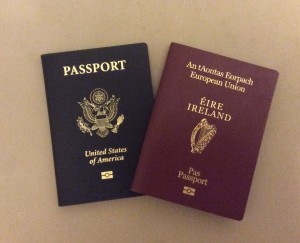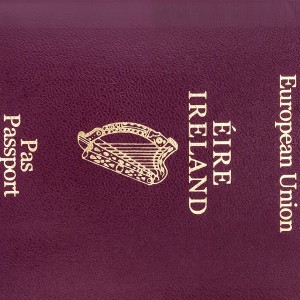Passport requirements for dual citizens entering Ireland
My wife had the pleasure of returning to the US for the Thanksgiving holiday this past November. It was a spur-of-the-moment trip, short and sweet, but an enjoyable break away since moving to Ireland. Before she left for the trip, we worried a little about what she would need on the way back to enter Ireland/Europe. She's a US citizen by birth, but became a dual Irish citizen a few years ago through Post Nuptial Certification. She travels with a US passport, and has not yet applied for an Irish passport.
When you become an Irish citizen you are given a certificate to prove your new status. My wife's cert is a laminated documented, not easily carried, and a little too valuable to be taking on trips. Before she left for America in November, I made a photocopy of that document, and our marriage certificate, and she took those along on the trip. A little naively, I thought that would be plenty of evidence for her to re-enter Ireland.
On her journey back, my wife had to travel through the United Kingdom, and then on to Ireland from there. She was given quite a lecture in London about her lack of proper evidence of residence in Ireland, and had a little bit of hassle on arrival in Ireland too. Thankfully, she was allowed re-enter the country.
So what should a dual citizen have when entering Ireland?

As it turns out, there is a stamp (endorsement) you can apply for and have entered in to your non-Irish passport, which will help you through entry points to Ireland and Europe. In the case of a non-EEA (European Economic Area) dual citizen, you can apply for a Stamp 6. According to INIS.gov.ie, a Stamp 6 "Without Conditions Endorsement is given to persons with dual citizenship -Irish and another. In order to qualify for this endorsement, the applicant must hold or be entitled to hold an Irish passport."
The information at the link above didn't give me all the answers I needed, so I sent an email to the office which manages this process. Here is our correspondence:
From Liam:
After receiving a stamp 6, is this stamp recognized when I travel through EU airports with just the foreign passport? i.e. will I be allowed enter Europe/Ireland with just a foreign passport that contains the stamp? Also, Is there a fee to receive the stamp?
Response from inisstamp5and6@justice.ie:
Please be advised that you may obtain the endorsement if you have a certificate of naturalisation. The endorsement permits you to leave and enter Ireland, only on a non EEA passport. Currently there is no fee for the endorsement.
The one downside to getting this endorsement in your passport is that you must attend in person at the Irish Naturalisation & Immigration Service office in Dublin. If you live in/near Dublin, it might be a good, temporary solution if you can't come up with the ~100 Euro for an Irish passport.
Other useful immigration links
Glossary of Irish Immigration Terms
Irish Immigration Contact Details
5 Comments Already
Leave a Reply
You must be logged in to post a comment.



€100 for a passport is small change compared to the cost of Irish citizenship http://www.citizensinformation.ie/en/moving_country/irish_citizenship/becoming_an_irish_citizen_through_naturalisation.html
As I am disabled and in receipt of state benefits I can’t qualify for citizenship having not “financially supported myself” for over 3 years.
That’s a ridiculous restriction to have in place for people with disabilities. I wonder if it has ever been challenged.
The other point is that it would cost me over €1000 as I would have to apply on residency being UK born.
The disability angle would be against EU law so easily challenged. Although I can see the point of someone having to be able to support themselves and their families.
My adopted Daughters (UK born) are Irish citizens as their birth father was born “on the Island”. My Grandfather was born on the island but his birth records are untraceable.
I agree with people needing to be able to support themselves. That’s also the case in America. However, clearly people with disabilities might be at a disadvantage to do so, and therefore (in my opinion) should be exempt.
The general rule for multiple citizenship is always enter and exit a country you are a citizen of with that countries passport. Anything else is looked upon with suspicion, and can be illegal in some countries. Good to hear there is a possible work around that for EU countries.